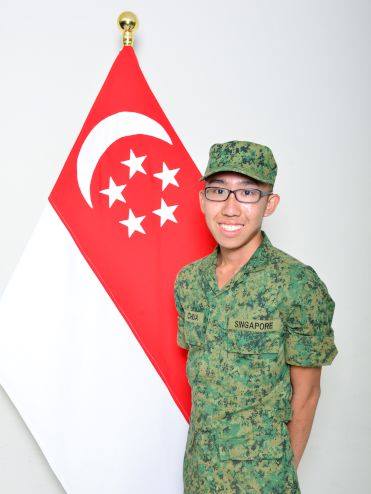
By Rhea Kumar
As I walked into Atticus on a snowy Sunday afternoon, my friend and classmate Jun Yan, SY’18, was already waiting for me. “Singaporeans tend to be very on the dot, and I happen to be super OCD about time,” he told me as we grabbed a table and cups of hot cocoa. I couldn’t help smiling a bit sheepishly as I recalled how I am continuously teased about my inability to make it anywhere “dot” on time.

Yan was born in Singapore and went to a predominantly Singaporean high school. While loyal to his country, Yan believes that going overseas and living independently is an integral part of one’s education, and this prompted him to apply to universities in the United States. Yale was his top university choice and he is clearly happy to be here. “I appreciate the liberal arts [education] as it allows me to take things [classes][sic] in and outside my field.” Yan plans to major in history, which he describes as a way of seeing the world in four dimensions, the fourth dimension being time. Since his major has no prerequisites, it gives him the flexibility to take the classes he really enjoys, from Music and Diplomacy (where we first met) to Apocalyptic Religions, Astrophysics, and Indonesian. It was Yan’s unique combination of classes that prompted me to interview him in the first place. “Having traveled thousands of miles to study at a very high cost, I believe in stretching my intellectual abilities,” Yan asserts. Yan also wishes to impart his love for learning to others; at Yale, he is involved with Yale Splash and Sprout, where he teaches a course of his choice to high school students. Later, he hopes to teach high school students for a living.
Like other Singaporeans his age, Yan worked in the military for six months as a signaler before coming to Yale and will resume his remaining compulsory service of two years after his undergraduate education. He told me that the military has not seen active combat in recent times, although it has taken part in peacekeeping and humanitarian missions. A coast guard protects Singapore’s borders while the majority of soldiers are stationed around the mainland, to be called on as required. “My training with the military would begin Monday and end Friday, allowing me to go back home over the weekend,” Yan explained.
Singapore lies in a relatively peaceful region of the world and has not had any imminent threat of war since confrontations between Indonesia, Malaysia, and Singapore in the 1960s. In an era where the vast majority of wars are now fought in the Third World, Singapore’s peace is remarkable. Much of it can be attributed to the Association for South East Asian Nations, of which Singapore was a founding member. “As any other international organization, ASEAN helps to lubricate tensions and foster stability as it gives a platform for countries to meet,” Yan said. Unlike other international organizations, the ASEAN does not have a single dominant power and makes all decisions based on unanimous consent among its members. “I think ASEAN is structurally designed to prevent domination,” Yan pointed out. “It also has a non-interference policy in domestic affairs which prevents domination by any one member.”

Yan is as interested in Singapore’s history as in its future development. As Singapore celebrates its 50th year of independence, Yan certainly seems optimistic about its future in a multipolar world. “While Singapore is smaller than New York and can never be a big power because of its physical size, it definitely has a significant influence [internationally] proportionate to its size, both economically and politically,” he said. “Also, Singapore is located on a strategic shipping route, from Suez Canal to the South China Sea, and has been an important port since the 19th century.”
However, like any other emerging power, Singapore has its problems, including lack of political freedom and some xenophobic sentiment. Yan is rather optimistic about the democratization that is taking place in Singapore. “Democracy is always a spectrum and I guess Singapore falls somewhere in the middle,” he said. “There is definitely a trend towards [political] liberalization.” Recently, a law restricting freedom of assembly has been relaxed and, in Singapore’s most recent election, the opposition party won 40% of the popular vote. Yan seems more perturbed about xenophobia. “Since immigration to Singapore in the 1990s, there have been problems of resentment to newcomers…manifested as racism and vitriolic sentiment expressed online. Some of these are [manifested as] legitimate concerns over infrastructure, employment, and a growing population. On the whole, Singapore is very welcoming and everyone in Singapore considers themselves Singaporean; there isn’t any diasporic [sic] sentiment [in Singapore],” Yan said
Growing up in a cosmopolitan environment like Singapore, Yan, believes culture shock is a little overstated. “Singapore is a very globalized place and the preponderance of US culture in the past 100 years has made the media we consume and the ideas we subscribe to very similar, so it [adjustment] wasn’t much of a problem,” he said. Even the snow and the cold do not bother him much, as the central heating more than makes up for it. “Putting on so many layers is annoying, though,” admitted Yan.
But minor quirky differences allow for some interesting anecdotes. Yan recalled a time when he was in the dining hall and asked his friend to get into the queue. His friend turned to him with an incredulous look on his face and said, ‘Did you just say queue?’ ” Yan’s innocuous story reminds me of a simple reality: regardless of how globalized the world is, some of our native traits stay with us for life.
Rhea Kumar ’18 is in Branford College. Contact her at rhea.kumar@yale.edu.